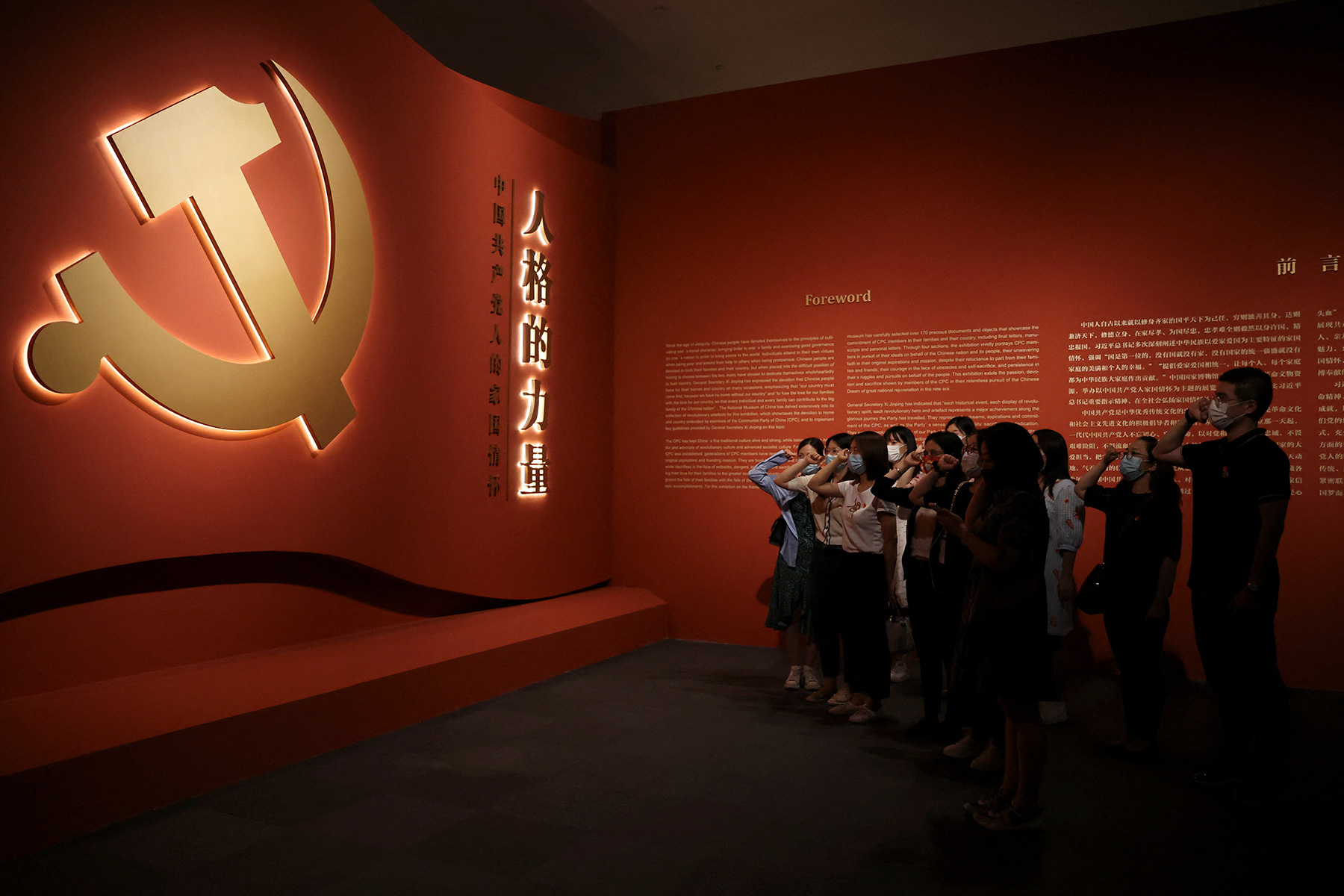China is building a new type of international relations, rejecting the zero-sum game in which the success of some is achieved at the expense of others. Consequently, the PRC does not see itself as a power which challenges the US hegemon in order to take its place. The overall gain can be considered the leitmotif of modern PRC foreign policy theory. It can be clearly seen in the article of the new PRC’s foreign minister Qin Gang.
The hope for a new type of international relations based on mutual benefit, unfortunately, is unlikely to materialise in the foreseeable future. For all the attractiveness of the idea of common benefit, modern international relations will move away from it in both the American and Chinese versions. The reason is simple. Even in a US-centric win-win system with all the unique benefits for the US, China has emerged as a capable power that, at some point, the Americans believe can challenge Washington.
If Washington is not prepared to tolerate mutual benefit with China even in its own system of international relations, then how can one imagine that it will be ready for such a scheme in the Chinese representation? The overall gain is a threat to US leadership. This means that things will shift to the “zero sum” model with all the ensuing consequences.
At the same time, the rivalry between China and the United States may well remain within a manageable framework. In the medium term, both Beijing and Washington are interested in this. This means that expectations of a global uprising against American leadership would be naive. In key issues of world politics, the PRC will exercise caution and adopt a balanced approach. Criticism of certain aspects of US foreign policy and the existing model of globalisation should hardly be taken as a readiness to unequivocally take the side of other US rivals.
The People's Republic of China has appointed a new foreign minister. Qin Gang, a career diplomat who went through all the key stages of the PRC’s Ministry of Foreign Affairs, has become the head of the Foreign Ministry. His predecessor Wang Yi was appointed head of the Office of the Foreign Affairs Commission of the CPC Central Committee. The new foreign minister previously served as Ambassador Extraordinary and Plenipotentiary of China to the United States.
Just a few days before his appointment to the ministerial position, Qin Gang published an article in the American magazine The National Interest, titled "How China sees the world." Qin Gang's article can be considered a farewell message to the American audience and outlines some of the conceptual guidelines for China's foreign policy. What does the material of the new minister say, how will US-China relations develop, and what does the article mean from an expert point of view?
The semantic context of the article of the new head of the PRC’s Foreign Ministry is naturally based on the guidelines outlined by President Xi Jinping at the 20th National Congress of the CPC on October 24, 2022.
The main idea is that the PRC pursues as its goal the achievement of the common good for all mankind. China is building a new type of international relations, rejecting the zero-sum game in which the success of some is achieved at the expense of others. Consequently, the PRC does not see itself as a power which challenges the US hegemon in order to take its place. The overall gain can be considered the leitmotif of modern PRC foreign policy theory. It can be clearly seen in the article of the new minister. The future of world politics is a choice between the paradigm of the 20th century, with its conflicts and upheavals, and an alternative paradigm, the version of which is proposed by the Chinese side. It addresses new challenges (pandemics, financial and economic crises, recession), the growth of conflict (including in connection with the conflict in Ukraine), the destabilising actions of external forces, including around Taiwan, and the artificial division of the world into autocracies and democracies. However, the new minister is also in no hurry to assign guilt. There are no harsh statements or accusations targeting anyone in the article, although in the text one can trace a neat hint that the problems mentioned did not arise from scratch. Qin Gang is fundamentally tactful, although an attentive reader understands the direction of thought perfectly. For the Russian audience, of course, what’s most interesting is his assessment of the Ukrainian crisis. There are also no labels to be found here about who is right and who is to blame: the conflict is harmful to everyone, there are no easy solutions, escalation to a confrontation between the big powers is dangerous, a dialogue between Russia and Ukraine is required, as well as between Russia and the collective West represented by the United States, the EU and NATO; a balanced and a sustainable European security system is needed.
The new minister's article provides food for an expert analysis. In its most preliminary form, such a reflection could be reduced to a few comments.
First of all, the hope for a new type of international relations based on mutual benefit, unfortunately, is unlikely to materialise in the foreseeable future. The world remains confrontational; the level of rivalry will increase. Relations between the PRC and the United States will become the axis of this rivalry. Apparently, such a scenario is taken seriously in Beijing, as evidenced by the strengthening of the armed forces, consistent measures to develop its own industrial and technological potential, an autonomous financial system, etc. Nevertheless, the very question of the need for a new paradigm in international relations is important. It sets the standard. While by default recognizing the inevitability of realism in modern international relations, it leaves room for higher goals, without elevating them, at the same time, to the level of an unrealisable utopia. The idea of mutual benefit is quite pragmatic and has many practical examples. In Russian foreign policy doctrine, its closest analogue is the idea of a polycentric world, although the Russian view has its own accents. The United States, for its part, also postulates its concept of common benefit. As such, the “order based on rules” and a mutually beneficial system of international economic and political relations, led by the United States, are positioned. The emphasis on one's own leadership, the superiority of ideas and institutions, distinguishes the American approach from the Chinese and Russian concept, with their emphasis on equality and sovereignty, although the idea of equal opportunities can be traced in the American foreign policy doctrine.
For all the attractiveness of the idea of common benefit, modern international relations will move away from it in both the American and Chinese versions. The reason is simple. Even in a US-centric win-win system with all the unique benefits for the US, China has emerged as a capable power that, at some point, the Americans believe can challenge Washington. Beijing's extreme accuracy in international affairs does not lessen the suspicions of the Americans. China's upholding of its interests in the South China Sea or on the Taiwan issue is perceived in the US as a sign that the PRC is pursuing a tougher line. Squeezing China out of an economy globalised in accordance with American standards would hurt the US itself. But in critical technologies and industries, the US wants to slow China down.
If Washington is not prepared to tolerate mutual benefit with China even in its own system of international relations, then how can one imagine that it will be ready for such a scheme in the Chinese representation? The overall gain is a threat to US leadership. This means that things will shift to the “zero sum” model with all the ensuing consequences. The world is objectively moving towards what Russian foreign policy doctrine calls a multipolar world or a world without a hegemon. But given current trends, such a world will most likely remain anarchic, with political realism as the key paradigm of foreign policy thinking.
For the US, China is a problem not only because of its impressive economic and technological successes. Unlike many other countries, China has formed its own political theory - a fairly unique and systematic view of both its own development and international relations. It's not just about a set of ideological clichés. We are talking about a developed political philosophy and a deep conceptual study of key issues of domestic and foreign policy. In the Chinese case, this is not an imitation or simulacra; not an empty set of words in a beautiful verbal package, but a system of interconnected ideas that can become globally attractive in the future. They are based on a combination of originally Western modernist ideas in their Marxist incarnation with a number of traditional Chinese values. For a long time, Chinese modernism was focused on China itself, that is, the political theory of the PRC remained and remains nationally oriented. China has avoided making strenuous efforts to globalise it. However, the success of the PRC itself gives its political theory a potentially high discursive power. The fight against world poverty, hunger, inequality, backwardness - who better than China, with its recent experience, to set an example here? If the PRC can achieve a solution to its own environmental problems, then green topics will be added. In other words, China is able to offer the world its modernist alternative and back it up with huge resources. This combination turns the PRC into a dangerous ideological enemy of the United States. The fact that China avoids confrontational rhetoric only draws more attention to its political philosophy. The potential appeal of PRC political philosophy is another reason why a mutual beneficial relationship with the US is unlikely.
At the same time, the rivalry between China and the United States may well remain within a manageable framework. In the medium term, both Beijing and Washington are interested in this. This means that expectations of a global uprising against American leadership would be naive. In key issues of world politics, the PRC will exercise caution and adopt a balanced approach. Criticism of certain aspects of US foreign policy and the existing model of globalisation should hardly be taken as a readiness to unequivocally take the side of other US rivals.
As for the Ukrainian conflict, unfortunately, the possibilities for its peaceful settlement are still extremely limited. The fundamental cause of the conflict was the defects in the European security system after the end of the Cold War. In this sense, Qin Gang correctly points out that there is no alternative to building a new balanced security system in Europe. Without it, any truce in Ukraine will be temporary and unstable. However, current realities make the creation of such a system unlikely. Europe runs the risk of finding itself in a situation of conflict and asymmetric bipolarity for a long time, with all the ensuing consequences and risks.
First published in the Valdai Discussion Club.







